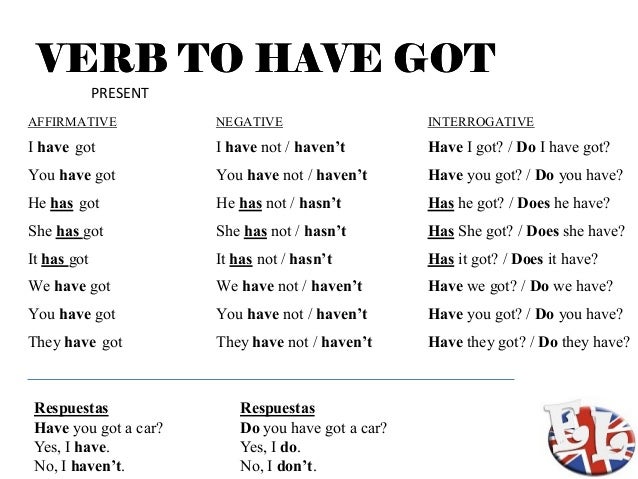https://www.youtube.com/watch?v=NbkyiO6mcYA&t=2s
The Verb To Have
| Forms of To Have | |||
|---|---|---|---|
| Present | Past | Continuous | |
| I / you / we / they |
have
|
had
|
having
|
| he / she / it |
has
|
had
|
having
|
Have is one of the most common verbs in the English language. It functions in various ways.
TO HAVE AS A MAIN VERB
As a main verb “to have” implies the meaning of possession.
For example: “I have a job.” “I have a car.“ "I don't have any time."
When it is used to indicate possession you can say "I have..." or you might see/ hear "I have got...".
When you are talking about actions, you only use "have".
For example:
Possession:-
I have a shower in my bathroom, I don't have a bath. = I have got a shower in my bathroom. I haven't got a bath.
The action:-
The action:-
I have a shower every day. - I'm having a shower now.
!Note - it does not take the continuous form "I having" - for that you have to use the auxiliary verb be.
!Note - it does not take the continuous form "I having" - for that you have to use the auxiliary verb be.
For example: “I am having a shower.” “Are you having a good time?"
The forms of the verb “to have” are have and has for the present and had for the past.
https://www.learnenglish.de/grammar/verbtohave.html
http://johansandoval29.blogspot.com/2018/03/verbo-to-have-ejercicios.html
http://johansandoval29.blogspot.com/2018/03/verbo-to-have-ejercicios.html


https://www.learnenglish.de/grammar/verbtohave.html
'To have': Presente simple afirmativo
Elige la forma correcta del presente simple afirmativo del verbo to have.
1 She ____ a new computer.
2 My house ____ four rooms.
3 I ____ short black curly hair.
4 I ____ a difficult exam tomorrow.
5 All my neighbours ____ wifi access.
6 He ____ a new girlfriend.
7 They ____ enough money for the concert.
8 My old brother ____ a big poster in his bedroom.
| 1) | I a dream. | Yo tengo un sueño |
| 2) | He eaten an apple pie. | Él ha comido una tarta de manzana |
| 3) | They a cat. | Ellos tenían un gato |
| 4) | We a beautiful garden. | Nosotros teníamos un jardín bonito |
| 5) | You a spider. | Tú tienes una araña |
| 6) | We a break. | Nosotros tomamos un descanso |
| 7) | He lived here for years. | Él ha vivido aquí durante años |
| 8) | She gone to Istanbul. | Ella había ido a Estambul |
| 9) | They bought a cheese. | Ellos habían comprado un queso |
| 10) | He won the race. | Él ha ganado la carrera |
| - Traduce al inglés las siguientes frases: |
| 1. John tiene un nuevo trabajo. 2. ¿Qué tienes en esa maleta?. 3. Tengo dos hijas. 4. Tienen muchos amigos en España. 5. ¿Tienes un minuto?. |

Singular
| Plural |
I have
|
We have
|
You have
|
You have
|
He has
She has
It has
|
They have
|

"Have" is usually used for ownership, ability, or for a description....
...but the word "have" is also a very popular substitute for the words "eat" and "drink."


Have is also an important helping verb:
In the example above, (have) + (past participle) make
|
I have glasses.
|  |
You have sunglasses.
|  |
He has a gun.
|  |
She has a tricycle.
|  |
The cake has a lot of fruit on top of it.
|  |
We have time to learn English.
|   |
They have a hamburger and french fries.
|  |
All three children have popsicles.
|  |
https://www.learnamericanenglishonline.com/Blue%20Level/B9%20Have.html
| Singular | ||
| Do I have ...? Have I got ...? | I have (I've) | I have not (I haven't/I've not) |
| Does he / she / it have...? Has he/she/it got ...? | He/she/it has (He/she/it 's) | He/she/it has not (He/she/it hasn't) |
| Do you have ...? Have you got ...? | You have (You've) | You have not (You haven't/You've not) |
| Did I / he / she / it have ...? Had I / he / she / it / you got...? | I / He / She / It / You had (I'd / He'd / She'd / You'd) | I / He / She / It / You had not (I / He / She / It / You hadn't) |
| Plural | ||
| Do we / you / they have ...? Have we / you / they got ...? | We / You / They have (We've / You've / They've) | We / You / They have not (We / You / They haven't // We've nof / You've not They've not) |
| Do you have ...? Have you got ...? | You have (You've) | You have not (You haven't/You've not) |
| Do they have ...? Have they got ...? | They have (They've) | They have not (They haven't/They've not) |
| Did we / you / they have ...? Had we / you / they got ... ? | We / You / They had (We'd / You'd / They'd) | I / He / She / It / You had not (I / He / She / It / You hadn't) |

No hay comentarios:
Publicar un comentario